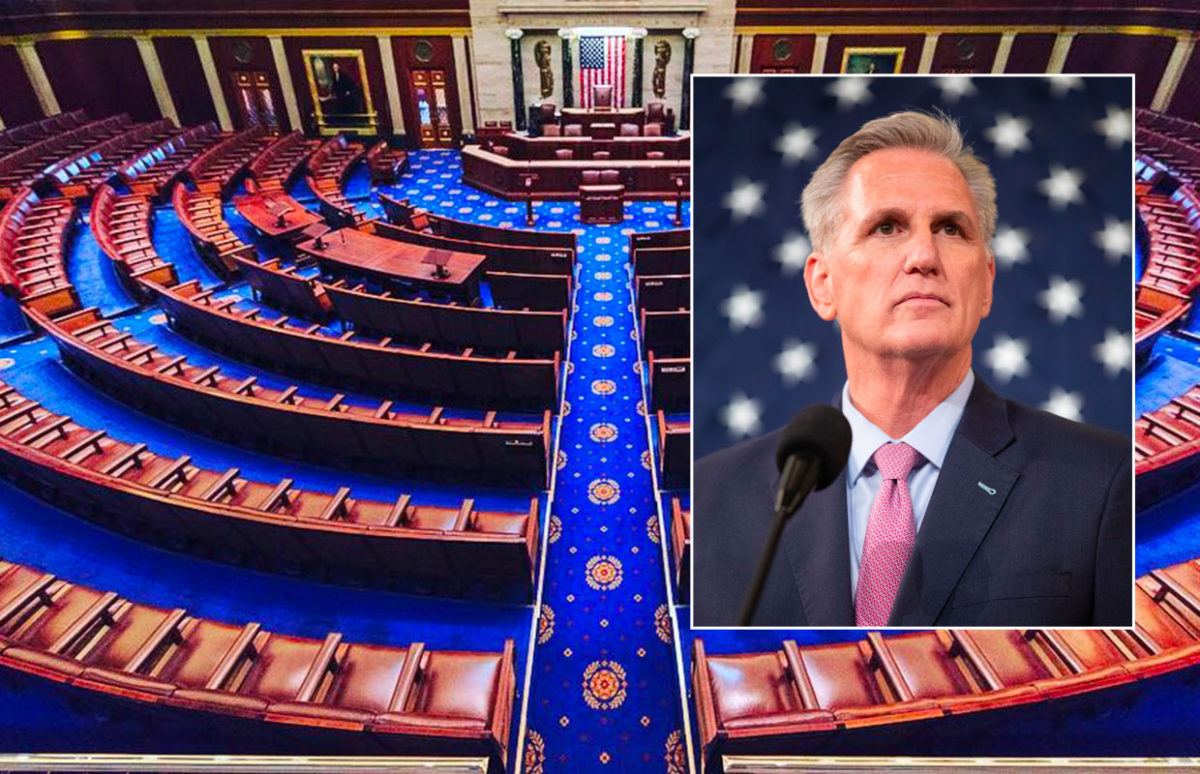On 3 October, Kevin McCarthy became the first ever Speaker of the U.S. House of Representatives to be voted out of his role. He had already made the news when had had to face 15 separate votes before being elected Speaker in January – most of the opposition coming from his own Republican Party.
The Speaker’s role is one of the most important in Washington. They are considered the leader of the majority party in the House. They control what legislation is debated, who sits on committees and who gets to speak in the House. They are also second in line, after the Vice-President, to replace the President in case of illness or death.
The Republican Party won a small majority in the House of Representatives in November’s midterm elections: 221-212. And as the majority party, it was expected that the speaker would come from its ranks. But at the initial vote, McCarthy, who represents a Californian constituency, faced bitter opposition from Representatives on the right wing of the party. The very last Republican to hold out from voting McCarthy was Florida Representative Matt Gaetz, and it was he who forced the vote on removing the Speaker this week.
This is how ABC News announced McCarthy's defeat.
Cohabitation and Compromise
U.S. government is in a complicated situation at the moment, some would say an impasse. With a small Republican majority in the House, and a small Democratic one in the Senate, as well as a Democratic President, the only way to get any legislation passed is to “reach across the aisle” and compromise.
Just days before he was ousted, McCarthy had managed to broker a deal where a majority of both parties in both houses voted for a short-term spending bill to avert a federal shutdown. The Senate voted 88-9 and the House 335-91 to pass a bill to keep the government open until 17 November.
What is a shutdown?
A shutdown happens if Congress doesn’t pass a budget to cover government spending at the beginning of the new fiscal year on 1 October. In theory it means federal civil servants stop being paid, and some are laid off temporarily, but a majority, considered essential workers, are actually obliged to carry on working without pay. There have been 14 shutdowns since 1981, though most only last a few days, but many more have been averted at the last minute.
McCarthy had also managed to gain consensus on the debt-ceiling debate in June which also threatened to see the U.S.A. in financial stalemate, unable to honour its debts. On that occasion, he persuaded President Biden to agree to spending cuts in exchange for McCarthy managing to obtain enough votes to pass a rise in the debt-ceiling, allowing the country to borrow more money.
On paper, that seems to attest that McCarthy had the support of both houses. But in reality, the right wing of his own party felt he had been playing into the Democrats’ hands, and that he should have used the threat of the debt-ceiling default and the shutdown to force them to agree to the large budget cuts the right-wing Republicans want. The Democrats, meanwhile, implied the Speaker battle was a Republican problem. In a letter to his colleagues before the vote, Democratic House Leader Hakeem Jeffries wrote, "It is now the responsibility of the GOP members to end the House Republican Civil War." (GOP stands for Grand Old Party, a nickname for the Republican Party.) Democrats were also unhappy with McCarthy for bowing to his right wing and authorising an impeachment inquiry into President Biden over allegations that his son Hunter engaged in improper business dealings that benefited the president.
So, when Matt Gaetz proposed a motion to vacate, which could be put forward by a single member of the House because of a concession McCarthy had made during his laborious election as Speaker, the Democrats voted the motion as a block and Gaetz only needed to persuade 7 other Republicans to follow him.
So What Next?
The House has appointed an interim Speaker, Patrick McHenry from North Carolina, one of the Representatives on a list McCarthy had nominated to replace him when he was absent from the House. McHenry immediately called for a recess until an election for a new Speaker, which could take place on Thursday 12 October. McCarthy rapidly announced he would not stand again, and it isn’t clear which Republican(s) will. The Democrats have nominated Hakeem Jeffries, but it would be very unlikely the minority leader could garner enough votes.
Whoever wins the election will have the unenviable job of negotiating another spending bill to avert a shutdown after the McCarthy one runs out on 17 November, during a turbulent nomination race for the Republican candidate in next year’s presidential election. It’s not surprising that no one seems to be rushing to be nominated as Speaker.
Trump?
As with the current nomination race, the shadow of Donald Trump looms large over the Speaker election. The Constitution doesn’t actually require the Speaker to be an elected member of the House, although there has never been a Speaker who wasn’t. Which means some Republicans have floated the name of the former President for the job. Given that he has not even accepted to participate in Republican debates to choose a Presidential candidate, despite having declared he is running, and leading in the polls, it seems highly unlikely he would be willing to accept the poisoned chalice of an extremely difficult speakership.
Copyright(s) :
Republican Party
> What’s Going On in the U.S. Congress?
> What’s at Stake in the U.S. Midterm Elections?
> U.S. Presidential Marathon
> A Youth Voice for Congress
> Joe Biden and Kamala Harris Profiles
> Meet Joe Biden and Kamala Harris
> President Trump Profile
Tag(s) : "Congress" "Donald Trump" "elections" "House of Representatives" "Joe Biden" "Kevin McCarthy" "midterms" "U.S. culture" "U.S. politics" "voting"





